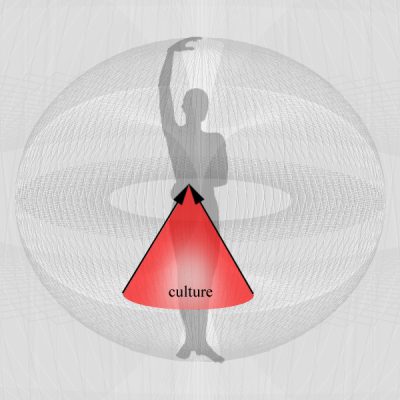




































representational inquiry regarding meaning » value » culture / valued by us / our 'is'
The X-node symbol combines a cone pointing up with the color red. With reference to the I-phase, this means experienced as world—what is commonly thrown before those of a given ordered system. With reference to the O-phase, it refers to the significance of worlds as objects of attention. When applied to the A-phase dealing with value, the logic of this term gets interpreted according to actual, practical (self/world) engagement over time, with the past below, the future above, and the present stretched out before us. In this case, the cone pointing up is convergently bringing our past to bear on our present circumstances. Its apex is in the present, and it's gathering together various influences from our past. It identifies our current state given our history: our is (as in the is/ought distinction), representing what we currently value, given our background. In this case, the cone is not so much a being-thrown-before as it is in the K-node of the I-phase, or an object of attention as it is in the O-phase; here it is being-thrown-together, con-jecturing with respect to the significance of that which is currently presentated before us. The cone pointing up thus means valued, and together with the color red, the X-node symbol means valued by us, representing the character of our culture.
The letter X is used to represent this node primarily given the relation of its proposed numerical value (700) to the other A-phase nodes as arranged in a magic square. See letter A for an explanation.
Additionally, with a little imagination, we might think of X as signifying a crossroads. People of different cultures meet at crossroads, and the X-node addresses cultural values. Thinking of X in this way might help us remember that we live in a world with people of many cultures, and it can be enriching to meet them at the crossroads. Presenting to us new possibilities, encounters with alternate modes of being can help us critically assess our own otherwise taken-for-granted cultural values, and the dialogue can broaden the horizons of both parties. Yet we must first make the choice to engage.
